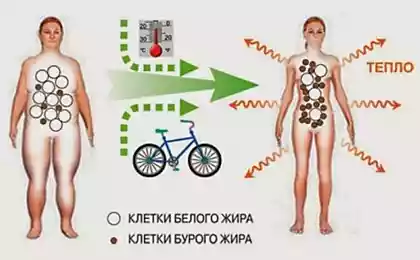533
Which is worse: sugar or fat
Have you explored the range of the Department "healthy eating" in the nearest grocery store? If it is the same as most others, there are plenty of Breakfast cereals with low fat, but rich in carbohydrates.
The problem is that a diet low in fat does not work. This is confirmed by years of research. In the experiment, which lasted 8 years, was attended by 50 thousand women, approximately half of which stuck to this "low-fat" diet.
The results showed that a diet low in fat did not reduce the risk of breast cancer, colorectal cancer (a tumor of the colon and rectum), as well as heart disease. In addition, the participants failed to achieve any notable weight loss.

However, far fewer studies have been devoted to the question of what would happen if the calories that we get from certain types of fat, replace with the same number of calories from carbohydrates, or, even more curiously, the calories from other fats.
This was the subject of a new study, whose results were recently published in the journal of the American medical Association.Scientists came to the conclusion that sugar, not fat, is a problem. This is not surprising.
Decades of research confirm that sugar is the true culprit of weight-gain, because in large quantities (and not being balanced with proteins and fats that your body processes over a longer time) its use may lead to sharp fluctuations of glucose in the blood. These jumps can cause so-called symptom of "hanger" or the simultaneous feeling of hunger and irritation.
All carbohydrates – bread, cereals and potatoes – eventually broken down to glucose, which circulates in our blood system and provides the body with energy. Sugar is split very quickly and could raise the level of glucose in the blood.
And according to the centers for disease control and prevention, the majority of calories Americans get from sugar, have processed products like cereal, granola bars, breads and cakes.
In the aforementioned study, the researchers observed the diet more than 126 thousand inhabitants, which for nearly thirty years filled out questionnaires about the condition.
In addition, the authors have tested experimentally that would have happened if these people had replaced the source of 5 percent of the calories in your diet with saturated fats (mainly found in meat and dairy products) to one of the following options: a) simple carbohydrates such as sugar and processed grain products; b) monounsaturated fats like those contained in avocado oil and olive oil; and b) polyunsaturated fats found in oily fish and nuts.
Not surprisingly, the first scenario, that is, replacement of calories from saturated fat calories from simple carbohydrates, did not result in any positive health effects, which the doctors could fix.
However, the second and third options were associated with several positive results. In General, the scenario "b", that is, the replacement of saturated fat by monounsaturated, demonstrated a 27 percent reduction in overall mortality and reduced risk of cardiovascular disease, cancer and neurodegenerative diseases.
And the script is "in", that is, replacement of calories from saturated fat calories from oily fish and nuts, led to a 13% decrease in total mortality and mortality from neurodegenerative diseases.
As said the study's lead author, Harvard Professor and nutritionist Dr. Frank Hugh in an interview with "The New York Times, "not all fats are created equal". In other words, certain types of fats may be more useful to us than others. "We need to eat more "good fats" found in fish and avocados, and less animal fat, "said doctor Hugh.
These findings are consistent with the results of dozens of other recent research supports the idea that healthy fats found in nuts, fish and avocados, in moderate amounts, is good for the human body. So if you haven't already, add them to your diet and try to reduce the consumption of refined carbohydrates and cereals with high sugar content.
Scientists propose the following "set of" simple rules for a start.
Make vegetables the basis of your diet. Or, as said by the journalist and culinary columnist Michael Pollan: "Eat a variety of foods. Not very much. Mostly — vegetarian".
Snack nuts. Because they are rich in protein, nuts help stabilize the level of glucose in the blood, which, in case of sudden fall, can cause in a healthy person, the symptom of "hangry", (simultaneous feeling of hunger and irritation), and is of particular danger to people with diabetes. Nuts are also a good source of fiber, a key nutrient that AIDS digestion and creates a feeling of satiety.
Avoid sugar and refined carbohydrates. The diet, in which many of these substances (white rice, sweet cereals, white bread) and not enough whole grains (brown rice, whole grain bread), is associated with health problems, while diets with high content of whole grains and low in refined carbohydrates, apparently, can lead to positive consequences.
To comprehend the genius: how da Vinci anticipated the most important trends in art of the XIX and XX centuries
The floating markets of Indonesia
Include in your diet oily fish, such as salmon. Salmon is rich in unsaturated fatty acids of the omega-3 group, which strengthen the membranes of our cells responsible for protecting the internal components of the cell from external influences. They are also included in the structure of hormones that regulate blood coagulation and controlling inflammatory processes.
Eat avocado. This product is rich in fat and has high calories: half a medium avocado contains 120 calories, which corresponds to the slice of bread. Avocado contains little sugar and lots of fiber. Thus, it is advisable to add a few pieces of this product at each meal.published
P. S. And remember, just changing your mind — together we change the world! ©
Source: gearmix.ru/archives/29679
The problem is that a diet low in fat does not work. This is confirmed by years of research. In the experiment, which lasted 8 years, was attended by 50 thousand women, approximately half of which stuck to this "low-fat" diet.
The results showed that a diet low in fat did not reduce the risk of breast cancer, colorectal cancer (a tumor of the colon and rectum), as well as heart disease. In addition, the participants failed to achieve any notable weight loss.

However, far fewer studies have been devoted to the question of what would happen if the calories that we get from certain types of fat, replace with the same number of calories from carbohydrates, or, even more curiously, the calories from other fats.
This was the subject of a new study, whose results were recently published in the journal of the American medical Association.Scientists came to the conclusion that sugar, not fat, is a problem. This is not surprising.
Decades of research confirm that sugar is the true culprit of weight-gain, because in large quantities (and not being balanced with proteins and fats that your body processes over a longer time) its use may lead to sharp fluctuations of glucose in the blood. These jumps can cause so-called symptom of "hanger" or the simultaneous feeling of hunger and irritation.
All carbohydrates – bread, cereals and potatoes – eventually broken down to glucose, which circulates in our blood system and provides the body with energy. Sugar is split very quickly and could raise the level of glucose in the blood.
And according to the centers for disease control and prevention, the majority of calories Americans get from sugar, have processed products like cereal, granola bars, breads and cakes.
In the aforementioned study, the researchers observed the diet more than 126 thousand inhabitants, which for nearly thirty years filled out questionnaires about the condition.
In addition, the authors have tested experimentally that would have happened if these people had replaced the source of 5 percent of the calories in your diet with saturated fats (mainly found in meat and dairy products) to one of the following options: a) simple carbohydrates such as sugar and processed grain products; b) monounsaturated fats like those contained in avocado oil and olive oil; and b) polyunsaturated fats found in oily fish and nuts.
Not surprisingly, the first scenario, that is, replacement of calories from saturated fat calories from simple carbohydrates, did not result in any positive health effects, which the doctors could fix.
However, the second and third options were associated with several positive results. In General, the scenario "b", that is, the replacement of saturated fat by monounsaturated, demonstrated a 27 percent reduction in overall mortality and reduced risk of cardiovascular disease, cancer and neurodegenerative diseases.
And the script is "in", that is, replacement of calories from saturated fat calories from oily fish and nuts, led to a 13% decrease in total mortality and mortality from neurodegenerative diseases.
As said the study's lead author, Harvard Professor and nutritionist Dr. Frank Hugh in an interview with "The New York Times, "not all fats are created equal". In other words, certain types of fats may be more useful to us than others. "We need to eat more "good fats" found in fish and avocados, and less animal fat, "said doctor Hugh.
These findings are consistent with the results of dozens of other recent research supports the idea that healthy fats found in nuts, fish and avocados, in moderate amounts, is good for the human body. So if you haven't already, add them to your diet and try to reduce the consumption of refined carbohydrates and cereals with high sugar content.
Scientists propose the following "set of" simple rules for a start.
Make vegetables the basis of your diet. Or, as said by the journalist and culinary columnist Michael Pollan: "Eat a variety of foods. Not very much. Mostly — vegetarian".
Snack nuts. Because they are rich in protein, nuts help stabilize the level of glucose in the blood, which, in case of sudden fall, can cause in a healthy person, the symptom of "hangry", (simultaneous feeling of hunger and irritation), and is of particular danger to people with diabetes. Nuts are also a good source of fiber, a key nutrient that AIDS digestion and creates a feeling of satiety.
Avoid sugar and refined carbohydrates. The diet, in which many of these substances (white rice, sweet cereals, white bread) and not enough whole grains (brown rice, whole grain bread), is associated with health problems, while diets with high content of whole grains and low in refined carbohydrates, apparently, can lead to positive consequences.
To comprehend the genius: how da Vinci anticipated the most important trends in art of the XIX and XX centuries
The floating markets of Indonesia
Include in your diet oily fish, such as salmon. Salmon is rich in unsaturated fatty acids of the omega-3 group, which strengthen the membranes of our cells responsible for protecting the internal components of the cell from external influences. They are also included in the structure of hormones that regulate blood coagulation and controlling inflammatory processes.
Eat avocado. This product is rich in fat and has high calories: half a medium avocado contains 120 calories, which corresponds to the slice of bread. Avocado contains little sugar and lots of fiber. Thus, it is advisable to add a few pieces of this product at each meal.published
P. S. And remember, just changing your mind — together we change the world! ©
Source: gearmix.ru/archives/29679
Cucumbers "Villainous": crispy, fragrant and very tasty
Audi promises to build three electric vehicle by 2020























